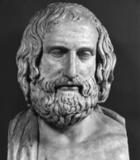
Euripides (Greek Ευριπίδης) (Salamina, 480 -. Pella, 406 BC) was one of the three great tragic poets of ancient Greeks, along with Aeschylus and Sophocles. His mother was Klitonis or Cleito and father Mnesarchus or Mnesárquides, alternative forms of the same name, merchant. Born in Phlya village central Attica, where they soon had to emigrate because of the Second Medical War, decisive for the Greeks and the Western world, he even as a child, heading for Athens. Known to have been a pupil of Anaxagoras of Clazomene, Protagoras, Archelaus and Diogenes of Apollonia Prodicus. In 466 a. C. served two years of military service. He hated politics and was a lover of the study, for he owned his own private library, one of the most complete of all Greece. For a time he was interested in painting, coinciding with the peak of the painter Polignoto in Athens. He had two wives, and Melito calls or Quérine Quérile. He was a friend of Socrates, who, according to tradition, only attended the theater when His plays were performed. In 408 a. C., disappointed by the events of their country involved in the interminable Peloponnesian War, retired to the court of Archelaus I of Macedon, dying two years later in Pella.




